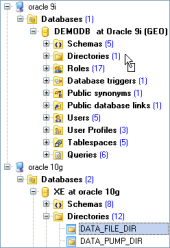Oracle Maestro online help
| Prev | Return to chapter overview | Next |
Storage option properties
Tablespace Name
Define the tablespace name in which Oracle Database creates the table, object table OID index, partition, LOB data segment, LOB index segment, or index-organized table overflow data segment. If you omit the field, then the database creates that item in the default tablespace of the owner of the schema containing the table.
Free (%)
Specify a whole number representing the percentage of space in each data block of the database object reserved for future updates to rows of the object. The value of PCTFREE must be a value from 0 to 99. A value of 0 means that the entire block can be filled by inserts of new rows. The default value is 10. This value reserves 10% of each block for updates to existing rows and allows inserts of new rows to fill a maximum of 90% of each block.
Used (%)
Specify a whole number representing the minimum percentage of used space that Oracle maintains for each data block of the database object. A block becomes a candidate for row insertion when its used space falls below PCTUSED. PCTUSED is specified as a positive integer from 0 to 99 and defaults to 40.
Init trans
Specify the initial number of concurrent transaction entries allocated within each data block allocated to the database object. This value can range from 1 to 255 and defaults to 1. In general, you should not change the Init trans value from its default.
Max trans
The parameter determine the maximum number of concurrent update transactions allowed for each data block in the segment. Since Oracle 10.1 this parameter has been deprecated. In latest versions Oracle automatically allows up to 255 concurrent update transactions for any data block, depending on the available space in the block.
Increase (%)
Specify the percent by which the third and subsequent extents grow over the preceding extent. The default value is 50, meaning that each subsequent extent is 50% larger than the preceding extent. The minimum value is 0, meaning all extents after the first are the same size. The maximum value depends on your operating system.
Initial extent
Specify in bytes the size of the first extent of the object. Oracle allocates space for this extent when you create the schema object. Use K or M to specify this size in kilobytes or megabytes.
Next extent
Specify in bytes the size of the next extent to be allocated to the object. Use K or M to specify the size in kilobytes or megabytes. The default value is the size of 5 data blocks. The minimum value is the size of 1 data block. The maximum value depends on your operating system.
Min extents
Specify the total number of extents to allocate when the object is created. This parameter lets you allocate a large amount of space when you create an object, even if the space available is not contiguous. The default and minimum value is 1, meaning that Oracle allocates only the initial extent, except for rollback segments, for which the default and minimum value is 2. The maximum value depends on your operating system.
Max extents
Specify the total number of extents, including the first, that Oracle can allocate for the object. The minimum value is 1 except for rollback segments, which always have a minimum of 2. The default value depends on your data block size.
Buffer pool
Use the clause lets to specify a default buffer pool or cache for a schema object. All blocks for the object are stored in the specified cache.
Note: You cannot specify this clause for a cluster table. However, you can specify it for a cluster.
Freelist groups
Specify the number of groups of free lists for the database object you are creating. The default and minimum value for this parameter is 1. Oracle uses the instance number of Real Application Clusters instances to map each instance to one free list group.
Freelists
For objects other than tablespaces and rollback segments, specify the number of free lists for each of the free list groups for the table, partition, cluster, or index. The default and minimum value for this parameter is 1, meaning that each free list group contains one free list. The maximum value of this parameter depends on the data block size. If you specify a Freelists value that is too large, then Oracle returns an error indicating the maximum value.
| Prev | Return to chapter overview | Next |





 Download
Download Buy
Buy
